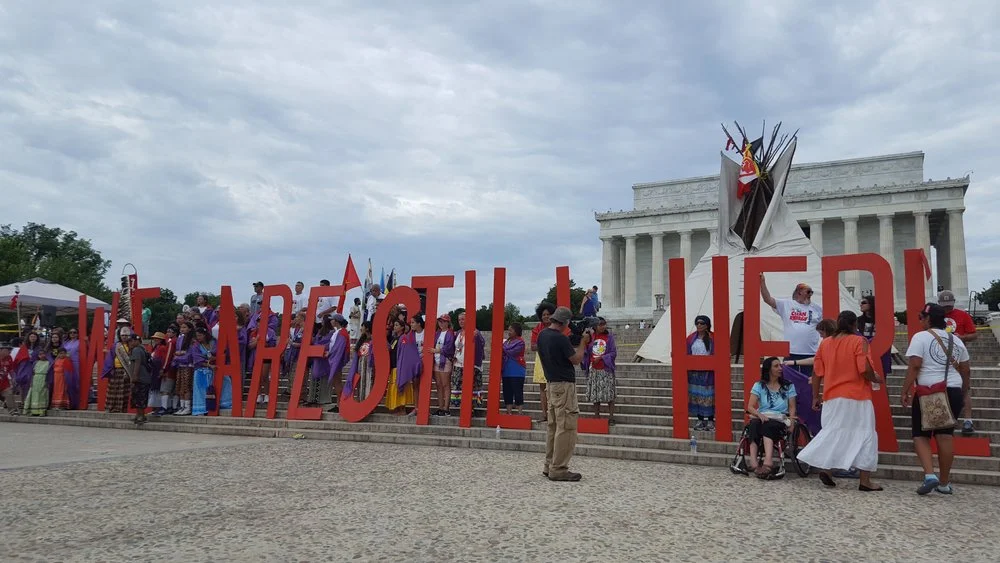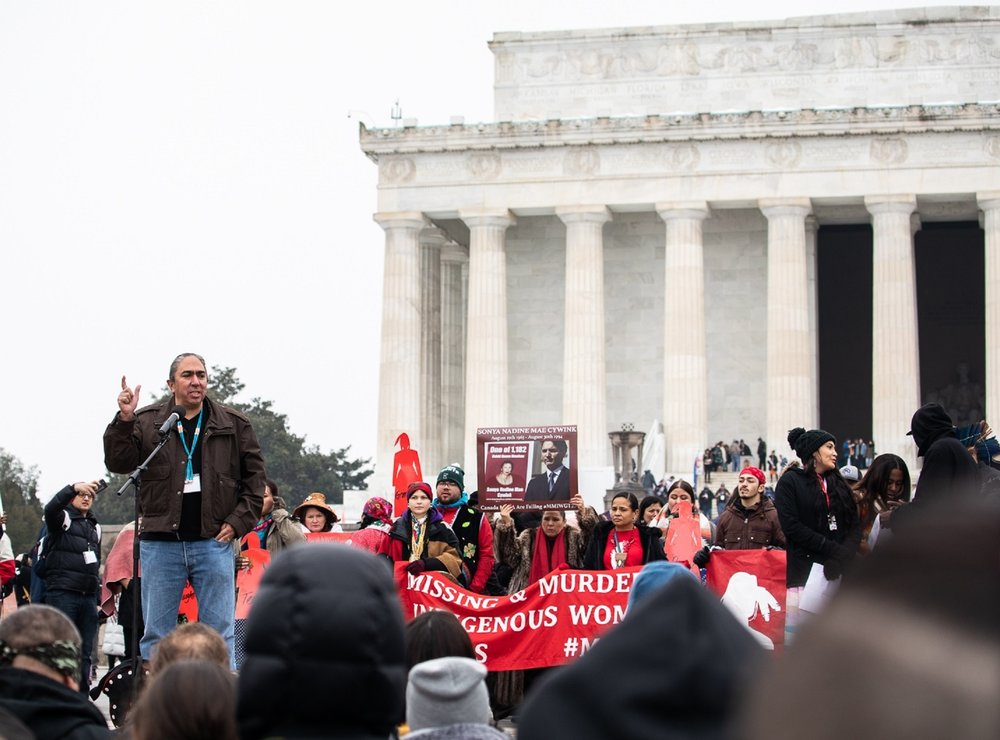An Independent, Native voice: Mark Charles launches 2020 presidential campaign By: Dario Thundercloud
The announcement
Mark Charles, a tribal citizen of the Navajo Nation, declared his intention to run for President of the United States with a YouTube video announcement on Tuesday, May 28. In his announcement video that runs nine-minutes long, Charles cordially invites an engaged public audience to follow his campaign. A campaign he refers to as an 18-month journey to create a national dialogue that is equitable and inclusive of all segments of American society.
"Do we want to be a nation where 'We the People' actually means All the People? Because if we do, then we have some foundational level work to do", Charles said in his announcement, referring to the U.S. Constitution and other foundational documents. He points out how these documents have dehumanized large segments of the American society.
“Our Constitution was written specifically and intentionally to protect the interest of white land-owning men,” says Charles. “The Constitution is doing exactly what it was designed to do. It’s protecting the interest of white land-owning men, and we don’t know what to do with this. Our founding document intentionally excludes women and all people of color. ‘We the People’ in the United States has never meant All the People. This is the conversation we need to have.”
Feeling marginalized
The aspiring presidential candidate grew up in small community just outside of Gallup, New Mexico, a border-town to the Navajo reservation. He attended one school from first to 12th grade until he graduated and moved to attend the University of California in Los Angeles. While at UCLA, Charles found endless opportunity to research and study the many effects of American colonization while earning his bachelor’s degree in history.
In order to reclaim his culture and strengthen an understanding of the modern day Native experience, Charles relocated his family to the Navajo reservation, his ancestral homeland. For three years, they lived in a traditional Hogan with no running water or electricity. Next to a sheep camp, it was very remote community six miles from the nearest paved road.
“We were prepared to live off the grid, but we weren’t prepared for the very intense marginalization that you feel on the reservations,” reflected Charles. “When living on the reservation, we realized a majority of non-Natives who ever go to reservations are those who come to give you charity and those who come to take your picture. Most people aren’t interested in building a long term, in-depth relationship.”
Charles realized the invalidation seemingly had no end, as Native communities are marginalized so deeply economically, educationally, and politically. From high percentages of unemployment to historical traumas, the social challenges in Indian Country cannot be offset even by cultural immersion and the richness of tradition.
It was his experience, at the traditional Hogan on Navajo Nation, which led Charles to take a major interest in how national political leaders engaged with Native communities. Realizing there was virtually no engagement, he decided that in order to bring these issues to the national forefront his family would have to uproot from the reservation to Washington, D.C.
A buried apology
“In December 2012, I had the privilege of hosting a public reading of the apology to Native peoples in front of the U.S. Capitol,” said Charles. “This apology was buried in H.R. 3326, the 2010 Department of Defense Appropriations Act. It was signed by President Obama on Dec. 19, 2009 but was never announced, publicized or read publicly by either the White House or the 111th Congress.”
The buried apology reads as follows: the United States, acting through Congress: (1) recognizes that there have been years of official depredations, ill-conceived policies, and the breaking of covenants by the federal government regarding Indian tribes; (2) apologizes on behalf of the people of the United States to all Native Peoples for the many instances of violence, maltreatment, and neglect inflicted upon them by U.S. citizens.
Charles and a group of passionate Native citizens read the buried apology through a microphone, their words carrying out to a diverse group of supporters who convened for the extraordinary occasion.
“When we prepared to host that reading I was convinced the problem was nobody knew about it,” recalled Charles. “I thought if we publicized it then there would be great interest, but found that wasn’t the case at all. There’s a reason the media doesn’t write about these things and political leaders won’t talk about them. In that moment, I recognized our nation doesn’t know how to deal with its history.”
With the moment of clarity, Charles understood how important it is to promote the need for a national dialogue on race, gender, and class on par with the Truth and Reconciliation Commissions of South Africa, Rwanda, and Canada. He would call ours a Truth and Conciliation Commission, because reconciliation implies a previous harmony that the U.S. has never had.
2016 election impact
The husband and father of three came to the conclusion that it’s really only every 4-years that we have an open, public dialogue about who we are and where we are going as a nation - during our presidential election cycles.
“I watched with great interest as Bernie Sanders, in 2016, used the presidential election process to get our nation to talk about something it didn’t want to talk about, which was systemic economic inequality,” said Charles. “Even though he didn’t win, he still deeply impacted and even changed the national dialogue.”
In order to bring the truly important and heartfelt issues plaguing the country to the forefront, Charles decided he would run to be the 46th president of the United States as an Independent candidate. By taking advantage of the upcoming election cycle while not being beholden to corporate interests, he intends to create a must needed national dialogue that focuses on our nation’s foundational issues.
An Independent platform
For generations, Native American citizens from tribes all over the country have felt disheartened, oppressed, and constantly marginalized by a United States government that refuses to listen to or even acknowledge the original peoples of this land. Regardless of which political party has governed from the oval office, Democrat or Republican, tribal sovereignty and treaty rights are routinely cast aside and treated as an unwelcomed speed bump instead of the supreme law of the land.
“Running as an Independent, while it’s the most difficult path to the White House, I’m convinced it’s the only path that actually gives me a chance of getting there,” explained the presidential hopeful. “As political parties, neither the Democrats nor Republicans are willing to fight for and deal with our foundational issues, like the Doctrine of Discovery, the codifying of slavery under the jurisdiction of the criminal justice system, or upholding treaty rights.
“Plus, there’s too much white land-owning male money influencing either party to ever nominate someone who is willing to articulate a deconstruction of our current system. A system that poses huge challenges to us as a nation because we have a broken foundation and very simplistic politics because of our two-party government, turns everything binary.”
U.S. political history clearly shows that most politicians and political groups aren’t interested in actually solving our nation’s more pressing problems, instead they are more interested in blaming the other party for the problem. Mainstream media has only amplified the political binary: left vs right, conservative vs liberal, pro-life or pro-choice, tax less or tax more, pro-gun right or pro-gun control. Creative solutions that don’t fit into the binary system are not given a strong voice and rarely broadcast to the public at large.
“There are changes we need to happen and most politicians don’t have the courage to even talk about them,” Charles said. “If I actually want to change the national dialogue and our current political system, then I have to establish a voice that isn’t controlled by that system.
“So much of what we’re trying to do is not just have different policies, but change the worldview we have as a nation,” added Charles of his purpose as an Independent candidate and Navajo citizen. “If we focus our solutions only on policy without changing the underlying worldview of exploitation and profit, then we’re only coming up with temporary solutions.”
Changing a worldview
“As I rollout my policies and stances on the issues, I intend to teach the history and help our citizenry understand what we’re dealing with today stems from the foundation our nation is built upon,” said Charles. “For example, climate change and the environment are extremely important issues that need to be addressed. However, when our foundation is exploitation and profit of not only the land, but entire groups of people, then our relationship with the environment can’t be one of sustenance. This is why we’re unable to deal with the current state of the environment properly.”
Whether it’s the construction of more and more oil pipelines, increased use of fracking, commercial deforestation, or an ever-growing reliance on plastic, nonperishable goods that destroy natural habitat and pollute our waterways, Mother Earth is under constant attack. By honoring our treaties and learning from Indigenous stories, we can enforce the last line of defense for the environment while simultaneously change our nation’s global outlook on hot-button issues like climate change and immigration.
“If we are going to solve this climate crisis, then we have to look to the wisdom of the Indigenous peoples of the land who have been living here sustainably for thousands of years,” explains Charles. “If we merely enact policies and don’t change the paradigm, whatever solutions we come up with will be temporary. We have to understand the stories of this land because they will give us a deeper connection and sense of stewardship, other than only seeing the land for exploitation and profit.”
Changing a worldview and broadening the national dialogue are hefty goals, yet are both ideal to creating long-lasting impacts that benefit all people, instead of a select few. Charles’ presidential candidacy built on an Independent platform serves to bridge a gap between a larger U.S. population who are so divided between team red and team blue that they often fail to choose representatives who in fact represent them. With the campaign slogan: “To build a nation where ‘We the People’ means all the people,” the 48-year-old Charles has his sets sight on making history.
Campaign trail
Mark Charles officially launched his 2020 presidential campaign from Navajo Nation in early July. “Because if you want to be President of the lands known as Turtle Island, the most appropriate and respectful way to begin your campaign is go fist to the Indigenous hosts of the land,” he said.
He plans to first travel to states with high Indigenous populations to rally support before looking to broaden his base. “I’m incredibly excited to have the opportunity to bring my campaign and vision before the Indigenous communities and Native nations of Turtle Island,” Charles shared about his immediate future. “I’m looking forward to seeing how our participation in this national dialogue changes the conversation.”
If you believe it’s time for “We the people to truly means all the people,” please support and follow Mark Charles’ 18-month journey to bid for the White House via his Twitter handle @wirelesshogan or visit his campaign’s official website markcharles2020.com for more information.
By Dario Thundercloud
Dario Thundercloud is a Coast Salish tribal member from the State of Washington. As a contemporary storyteller his top priority is advocating for truth, and sharing it in both the spoken and written word. Thundercloud developed strong analytical and communication skills for a career in digital and traditional media while earning a Bachelor’s Degree from the University of Washington. Thundercloud enjoys being a father, a good sweat from playing basketball, and participating in cultural activities.




